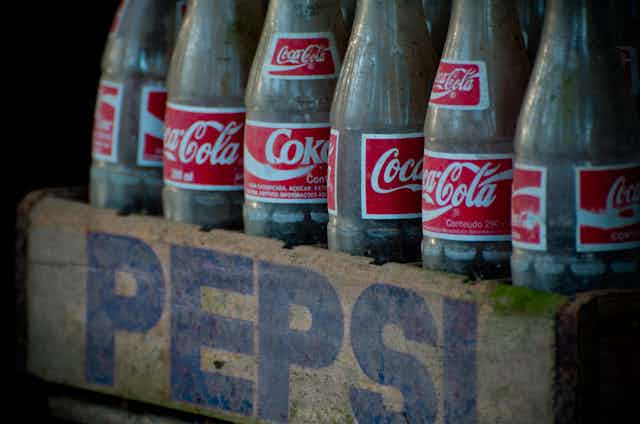Oxfam has announced the latest set of results from its Behind the Brands project to influence ten leading food and beverage companies to reform their supply chains. The charity’s efforts are only the most recent in a long and lively history of campaigns to reform business practices across a number of industries.
Rather than encouraging boycotts, Behind the Brands urges companies such as Coca Cola, Danone and Kelloggs to improve by regularly monitoring their performance and providing that information to consumers. The latest results reveal that, during the past year, there has been an improvement in the condition of women in supply chains and in the attention paid by companies to land rights. Oxfam has responded positively to these developments, but has emphasised that the campaign will continue.
There are precedents for campaigns tackling Oxfam’s themes of transparency at the corporate level and improvements for workers from as early as the medieval period. But how was this encouraged and why?
Transparency in business operations was a key concern even for medieval consumers. They wanted to be assured that traders were consistently honest in their business dealings, would treat customers fairly and would sell goods of the correct quality and quantity. Manuals instructed businesspeople to “cherish the honour and the good welfare of your city” and “always act according as is right”. Honesty and integrity in business were principles that also guided the Quaker firms of the eighteenth century onwards, including the chocolate manufacturers Cadbury’s and Rowntree’s.
Paved with gold
Transparency can be communicated in a variety of ways. In the medieval period engagement with the local community was crucial. Successful merchants like Richard Whittington made donations to infrastructure projects which reinforced their ties to their local community. Craft organisations in York performed plays of biblical tales related to their professions – the fishmongers performed Noah’s Ark. Long-term investment in the area and codes of behaviour were both emphasised.
Failure to adhere to these standards had serious consequences for firms. Informally, manuals warned medieval merchants of the risk of losing “their trade contacts” if they behaved deceitfully. Formal regulations also governed how firms could operate from around the beginning of the 13th century – and breaking those regulations could result in a large fine, imprisonment or physical punishment. Opportunities for reform and to learn from mistakes were provided. However those who persistently broke the rules were banned from trading for at least a year. There was therefore an incentive for businesses to comply.

Oxfam’s desire to improve working conditions also has earlier parallels. Some contemporary companies, such as Nike, now provides consumers with data on the different factories in its supply chain on its website. But factory inspections have been used in many instances to promote transparency in the treatment of the workforce. Cadbury’s promoted its factory in Bournville, Birmingham as “the factory in a garden”. Publicity material from the 19th and early 20th centuries, produced for visitors, promotes the amenities for workers, including recreational facilities and housing.
William Hesketh Lever, whose company eventually became part of Unilever, also integrated the treatment of workers at his factory and village complex Port Sunlight into the broader promotion of Sunlight Soap. The firms benefited from the positive publicity and the workers benefited from improved conditions relative to other factories at the time. The irony of now being one of the targets of the Oxfam campaign won’t be lost on Unilever.
A sour taste
The Behind the Brands campaign has developed as consumers are increasingly separated, by both the supply chain and by geographical distance, from those who supply their goods, and there are echoes of that in the arrival of the railways in Britain and the US.
Milk and meat could, for the first time, be prepared and packaged in one location and then transported some distance to another location for sale. In his novel, The Jungle, Upton Sinclair recounted some of the dangerous practices, including the sale of meat from diseased animals, that occurred in the Chicago meat plants in the early 20th century. He also highlighted the poor working conditions of the employees.
In the UK, the medical profession highlighted the increasing amounts of dangerous chemicals that were being added to milk to preserve it during the train journey from the Home Counties to London.

Media attention was drawn to these issues, and consumers were educated through cartoons and rhymes about how to detect such defaults in their foodstuffs. Although no immediate changes were made in either industry, the presence of problems was highlighted. It is a route that Oxfam acknowledges, choosing to focus on consumer education in its campaign, while accepting that the process of change may be gradual.
And any campaign in the corporate world, especially one as focused as Oxfam’s, brings an element of reputational risk, making a firm’s desire for a positive brand image a hugely important element in any attempts to force reform. Numerous references exist in medieval trade regulations to the “damage” and “scandal” that could occur to a business that broke regulations or failed to meet consumer expectation.
Working with businesses can also encourage action on the part of other stakeholders. Local governments in medieval towns recognised that the business practices of firms in their city reflected on the economy of the city as a whole. In 1344 in London, for example, local government took direct action to ‘maintain the reputation of the skinners’ trade and in 1379 in Leicester the local government appointed inspectors in response to poor business practises amongst the weavers.
One crucial difference between these historical examples and the situation today, of course, is that highly local changes are no longer enough. Throughout history, consumers have had certain expectations of how businesses should behave both towards customers and towards employees, but the shift to a “global market” has changed the ways that consumers and firms can interact. Oxfam will hope it can continue to harness those medieval instincts on a far grander scale.

